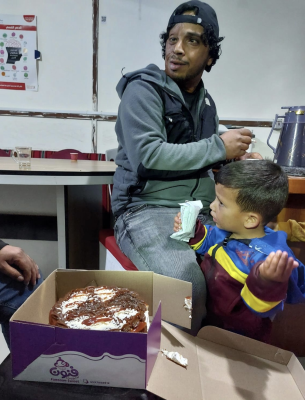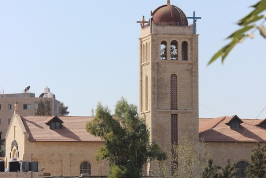Awdah Hathaleen - your memory is most certainly a blessing

Awdah with his son and the cake Maureen left for him - on what was to be his last birthday.
Awdah Hathaleen was killed on Monday 28 July 2025, shot dead by an Israeli settler. This 31-year-old husband, father of three young boys, and English teacher was a leader in his Palestinian community of Umm Al Kheir, a village in Masafer Yatta in the south of the West Bank. Awdah was renowned for welcoming Jews and Christians alike to his village.
I first visited Umm Al Kheir on 29 October 2008. I was serving with Christian Peacemaker Teams (CPT) in the nearby village of At Tuwani, when we got a call to say that there was trouble there. Two of us got a lift to Umm Al Kheir. It looked as if an earthquake had hit. An Israeli military bulldozer had demolished the homes of 53 of the 160 villagers. One young woman holding her young baby asked me where they would sleep that night. That wasn't the first day of demolitions in Umm Al Kheir and, sadly, it was far from the last.
After the creation of the state of Israel, Palestinian families living near Arad, in what is now part of Israel, bought land in the southern West Bank and established the village of Umm Al Kheir. All was well for some years until, in the early 1980s, the illegal Israeli settlement of Carmel was established there.
The contrast now between Carmel and Umm Al Kheir could not be more stark. To go there is to encounter apartheid face to face. Carmel looks like any modern housing estate in a developed western country. Just a few feet away, Umm Al Kheir, on the other hand, now that all its more substantial homes have been demolished, is a motley collection of shacks and tented homes. Carmel has all modern amenities. The Israeli authorities do not allow Umm Al Kheir to have mains water or mains electricity. There are electricity wires running above the village, but they take electricity from the settlement to the settlers' chicken barns. Increasingly, local settlers have been coming into the village to harass the villagers, and have been encroaching on their land.
Awdah was just a teenager the day of my first visit. But he soon emerged as a leader in and spokesperson for his community. I met him a number of times with CPT and Church of Scotland visitors. He was a main contact for Israeli and international visitors and also, importantly, for volunteers from groups such as the Ecumenical Accompaniment Programme in Palestine and Israel (EAPPI) and the Centre for Jewish Nonviolence (CJNV). He was unfailingly warm and welcoming, giving freely of his time.
One thing that struck me about him, even when he was a very young man, was his commitment to local children. He was determined to ensure that their lives would be better than his. It's no accident that there's a brightly-coloured play area for the children in the centre of the village, or that there is a football field (Awdah himself was mad about football.). He had an impish sense of humour too. He was instrumental in introducing bees into the village. While he commented seriously on how bees could come and go across borders, he took a mischievous delight in the fact that their Umm Al Kheir bees brought back Israeli pollen from the settlement flowers to make Palestinian honey.
I had hoped to see Awdah when I was in the village this April. It happened to be his birthday and I'd taken a chocolate cake for him. But, typically, rather than celebrating with his family, he had spent the day at the local Israeli police station trying to lodge a complaint about an incident two days before.
It's no surprise that Israelis and internationals came to Umm Al Kheir in numbers the day after Awdah's death to mourn him. Sadly, it's no surprise either that the Israeli army prevented his close friends in the Villages Group from reaching the village. Or that the army declared the
village a closed military zone and made everyone apart from the villagers leave. Cruelly, the Israeli authorities are so far refusing to release his body, and are refusing to allow him to be buried in the village he so loved, and where he was, and is, so loved.
There is a Jewish saying when someone dies: 'May his memory be a blessing.' Dear Awdah, you life was most certainly a blessing, and your memory definitely is.
Maureen is a Church of Scotland Elder, and former Convener of the Church of Scotland's Middle East Committee. She has served with EAPPI and CPT in the West Bank, and with CPT in Baghdad and on Lesbos.
EAPPI write in a statement:
We are outraged by the killing of Awdah Hathaleen, a Palestinian human rights defender, by Israeli settlers yesterday in the occupied West Bank.
Awdah was a much-loved activist and journalist who helped make the Oscar-winning documentary 'No Other Land' and fought tirelessly to prevent the ethnic cleansing of his home.
Awdah's community of Umm al Khair is close to our hearts at EAPPI. We grieve with his family, friends, and all those who continue to resist the daily violence of this illegal occupation.
We once again call on the British and Irish governments to take immediate and concrete action in line with the International Court of Justice's ruling:
The occupation is illegal, must not be supported by other states, and must be dismantled.
If you feel moved, please write to your MP or TD. Call on them to take action to end the occupation and uphold international law.
Awdah's last message before being killed was:
"The settlers are working behind our houses and … they tried to cut the main water pipe for the community … If you can reach people like the Congress, courts, whatever, please do everything."
Let us each do our part to put an end to this occupation.
In grief and solidarity,The EAPPI UK and Ireland Team
Read more in the Guardian
Watch No Other Land: www.indcatholicnews.com/news/51851


















